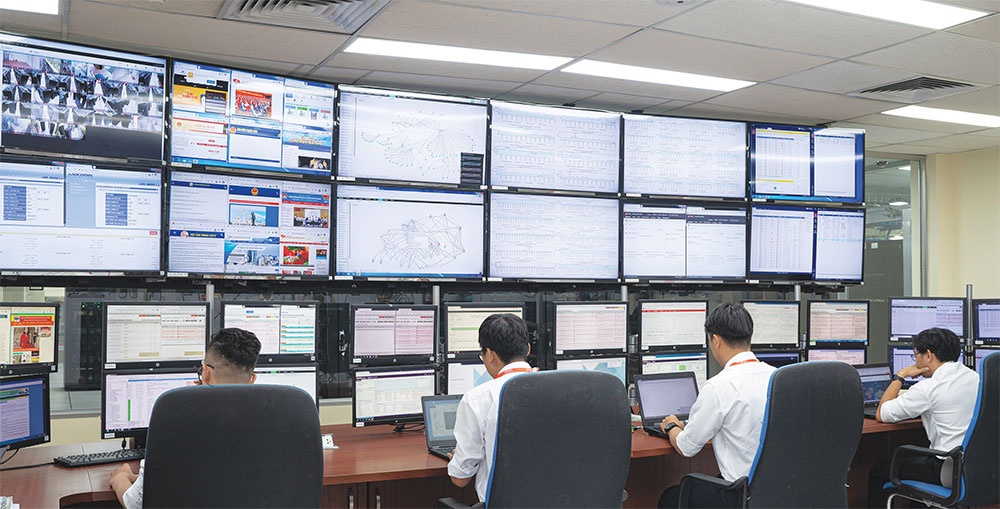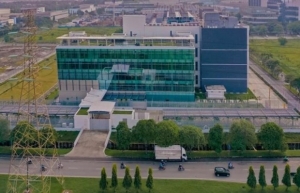Attention seized in data centre growth
 |
| The number of data centres has been snowballing in recent years, as well as their revenues, photo Le Toan |
Nguyen Huu Hong Phong, director of IXT Vietnam Co., Ltd., and his team took part in a data centre convention in Hanoi to seek new opportunities after entering the local market about one month ago.
“The Vietnamese market is witnessing strong development of data centres, not only in state agencies, but also in the private sector. We see a lot of growth potential here,” Phong told VIR.
“We have made preparations for a long time, and are making significant investment in human resources. We expect more new opportunities in 2024,” he said.
Based in Singapore, IXT focuses on turnkey design and build and maintenance services for data centre infrastructure. It is working with some partners in Vietnam to develop infrastructure for data centres, Phong said.
Seeing this growth potential, a delegation of the Association of Telecommunications and Technology Industry of Singapore visited Vietnam’s northern province of Ha Nam on August 25 to forge further business development, including of investment promotion, higher learning on technical and technology training, telecoms, ICT, the cloud, and data centre related sectors, among other areas.
Likewise, Cummins DKSH Vietnam, TechX, Eaton, and others are also betting on the local data centre market. Set up in 2009, Cummins DKSH Vietnam LLC’s core business lines are engines; power generators for data centres, factories, and residences; and after-sales services.
General manager Phan Thanh Nhat said, “Vietnam’s data market is in the early stage of development. Therefore, there is plenty of room for businesses to join. We plan to continue to develop our data centre segment to serve growing demands.”
In data centres, the important factor is to ensure continuation of power sources, Nhat added. “With international-standard power generators, we want to bring advanced technologies to data centres in Vietnam,” he said.
Currently, Cummins DKSH Vietnam LLC is supplying equipment for most of the key digital technology suppliers in Vietnam.
According to industry insiders, Vietnam’s data centre market is growing stronger than ever, driven by growing storage demand, the government’s strategy and high growth potential ahead. This puts the local market on the radar of international businesses.
Prof. Eryk Dutkiewicz, head of the Electrical and Data Engineering School at the University of Technology in Sydney, said, “For successful digital transformation, developing the data centre industry is a must for Vietnam. It needs to invest in national infrastructure and strengthen the training of skilled workers, which will put Vietnam in a competitive position to lead in the region.”
Nokia Vietnam’s general director Ruben Flores added, “According to data from 2016-2020, the sector in Vietnam grew about 12-13 per cent per year. This will continue to be promoted with the national digital transformation programme and then the deployment of 5G.”
Vietnam is accelerating the process of green transformation, digital transformation, and sustainable digital economic development. Along with this process, the country is also accelerating the development of infrastructure for digital transformation, with one of the important platforms being data centres.
The Ministry of Information and Communications plans to increase the number of businesses operating data centres or cloud computing to 14, and the number of data centres will increase to 55 by 2025. Multi-target data centre clusters at regional level are also planned for key economic areas.
Ministry figures show that in 2020-2022, revenues from data centres grew 18 per cent. In the 2023-2025 span, it is projected that revenue growth will be 30 per cent on average higher for both data centres and cloud computing.
As shown in the Vietnam Data Centre Market report 2023 released by Research and Markets, data centre market size in Vietnam is forecast to almost double to $1 billion in 2028 compared to last year.
Vietnam now has nine data centre operators, with Viettel Group and VNPT being the major operators. Private Vietnamese companies are joining the race, with CMC Telecom, FPT Telecom, Netnam, GMO, and BizFly Cloud increasing their share.
| Miho Nishida - Chief representative of Kawasaki Trading Co., Ltd The Vietnamese IDC market has big potential in Southeast Asia with 15 per cent annual growth, which we believe will last into the future. Kawasaki has just cut into Vietnamese market and standby turbine generators seem unfamiliar to Vietnamese customers. The product promotion shall be carried out widely at first. Compared to diesel engines, Kawasaki GPS standby turbine generators have served as backup power solutions since 1976. With over 8000 packages delivered worldwide, they have proven themselves with continued high reliability through all phases of operation, compact installation space and/or clean emissions. Moreover, Kawasaki has more than 90 per cent shares of standby power generators for the internet data centre market in Japan. |
| Ngo Manh Ha - Chief Technology Officer, TechX In recent years, financial and banking enterprises have always been the pioneers in promoting the cloud migration process globally and in Vietnam. Most of these enterprises have a comprehensive and scientific roadmap to fully leverage the power of cloud technology while fully complying with Vietnamese government policies. This group has been widely adopting and implementing cloud computing services and solutions for digital banking, digital insurance, digital finance, mobile banking applications, customer service portals, sales and marketing omnichannel, etc. Thanks to the robust application of technology and the advantages of cloud computing, financial and banking institutions are constantly innovating their products and services. The Financial Service Institutions sector is also the fastest mover in transitioning from traditional approaches to data-driven digital business models. FSI companies are the driving force behind the growing popularity and strength of cloud computing. In return, cloud technology is also the critical changer that helps FSI companies overcome difficulties and assert their position, achieving rapid and outstanding development. Multi-cloud is the most popular cloud computing application trend among banks and the FSI sector. Banks and financial institutions always seek top-tier security and balance. Therefore, these organisations will choose the best available platforms once they have selected a cloud computing strategy. During this selection process, financial companies will prioritise the multi-cloud trend to ensure the following factors: security, balance, availability to maximise the strengths of each platform, and optimise costs. The second trend to mention is application modernisation. When legacy applications migrate to the cloud, they must undergo a re-architecture and modernising process to take full advantage of technology at a minimum cost. Therefore, re-architecting and modernisation will be the main focus of the next few years. AI and big data are the following trends. Cloud adoption must go hand in hand with utilising these technologies. Finally, banking and financial institutions know their need to master cloud technology. There are heavy investments in human resources training and transforming to own an in-house team of high-quality experts in cloud computing. As an advanced consulting partner of AWS in Vietnam, TechX is committed to and is ready to accompany businesses for the long term on the journey and roadmap to the cloud. |
| Tran Mai Huong - General Director of Schneider Electric IT Vietnam & Cambodia Vietnam is a vast potential market in the global digital transformation picture, especially in the field of edge computing/data centers, possessing many advantages such as stable political context, support from the government, and young population. Now and in the future, Schneider Electric's top priority is to empower our users and partners to make the most of our energy and resources around the world. Schneider Electric will continue to innovate and research solutions and technologies to meet all customer needs. We understand that Vietnam faces major challenges in dealing with climate change, and businesses have an important role to play in achieving global climate goals by 2030 and net-zero emissions by 2050. With the rapid development of Revolution 4.0, Vietnamese businesses now have greater opportunities than ever in approaching, applying comprehensive digitalisation, optimising production operations and developing markets in a sustainable way, while generating higher long-term business profits. Schneider Electric's sustainability strategy focuses on digitalisation and energy management solutions including IoT connectivity, cloud analytics, and real-time monitoring. These solutions are playing an important role in helping businesses across Asia progress in a sustainable way, ensuring safety and optimising growth. The key to accelerating this roadmap is the combination of digitalisation and electrification to drive energy efficiency and greening. It is the optimal solution to enhance energy security, resource recovery and decarbonization. Access to clean and green energy is important for Vietnam's sustainable development. Schneider Electric is committed to addressing the gap in energy access by deploying technology to realise the benefits of alternative energy sources and storage opportunities. In addition, Schneider Electric is launching a number of new services to meet the growing challenges associated with climate change: Climate change advisory services, greenhouse gas reduction and climate risk assessment services for linked supply chains, and communication services, including CSR/ESG reporting and assessments. |
 | The digitalisation wave to boost data centre growth The Asia-Pacific data centre market is one of the fastest developing regions, and it is on track to become the world’s largest over the next decade. |
 | Data centre appeal poised to expand Vietnam’s data centre sector is poised for substantial growth, although challenges surrounding regulations, construction, and mounting demand for energy efficiency need to be effectively navigated. |
 | Indonesia plans to build various national data centres The Ministry of Communication and Informatics of Indonesia is aiming to complete and inaugurate a national data centre in Bekasi district, West Java province, by October 2024. |
 | Prospects bright for data centre and cloud infrastructure development Vietnam now has nine data centre operators, 30 cloud centres, 571,000 servers, and 54.7 million physical cores. Viettel Group operates 13 data/cloud centres, VNPT seven, and the rest run by other businesses. |
What the stars mean:
★ Poor ★ ★ Promising ★★★ Good ★★★★ Very good ★★★★★ Exceptional
Themes: Digital Transformation
- PM sets five key tasks to accelerate sci-tech development
- Ho Chi Minh City launches plan for innovation and digital transformation
- Dassault Systèmes and Nvidia to build platform powering virtual twins
- Sci-tech sector sees January revenue growth of 23 per cent
- Advanced semiconductor testing and packaging plant to become operational in 2027
Related Contents
Latest News
More News
- Ho Chi Minh City launches plan for innovation and digital transformation (February 25, 2026 | 09:00)
- Myriad risks ahead, but ones Vietnam can confront (February 20, 2026 | 15:02)
- Vietnam making the leap into AI and semiconductors (February 20, 2026 | 09:37)
- Funding must be activated for semiconductor success (February 20, 2026 | 09:20)
- Resilience as new benchmark for smarter infrastructure (February 19, 2026 | 20:35)
- A golden time to shine within ASEAN (February 19, 2026 | 20:22)
- Vietnam’s pivotal year for advancing sustainability (February 19, 2026 | 08:44)
- Strengthening the core role of industry and trade (February 19, 2026 | 08:35)
- Future orientations for healthcare improvements (February 19, 2026 | 08:29)
- Infrastructure orientations suitable for a new chapter (February 19, 2026 | 08:15)

 Tag:
Tag:



















 Mobile Version
Mobile Version